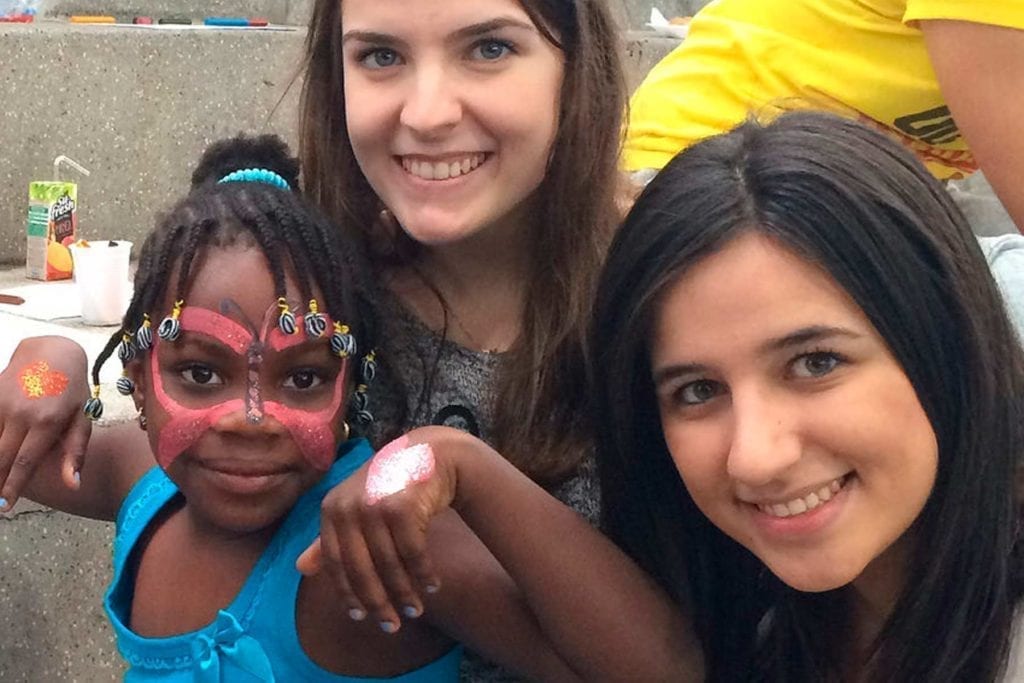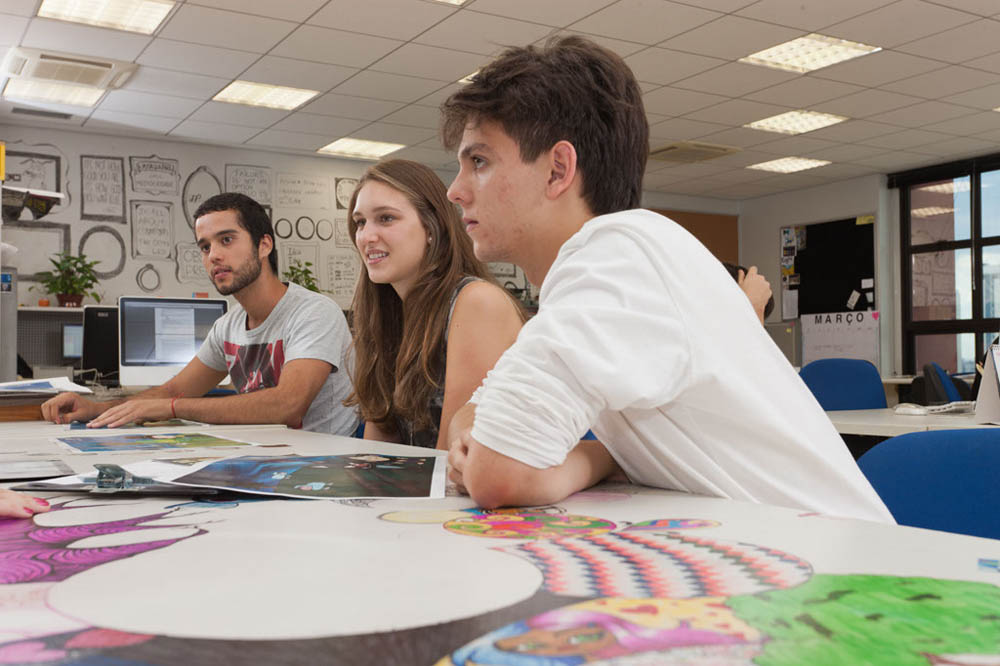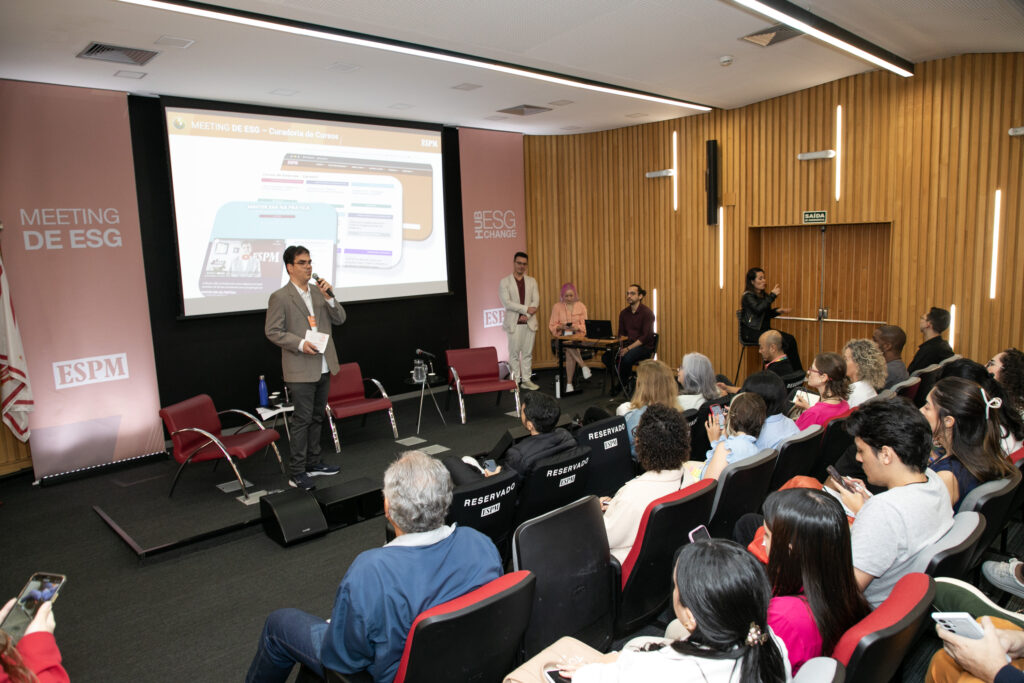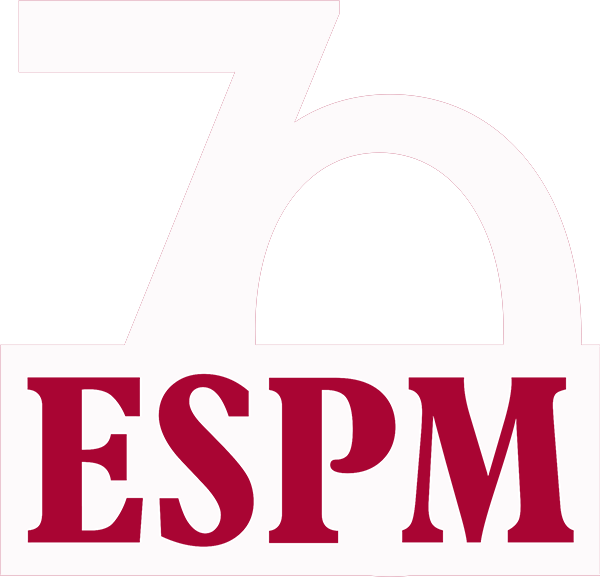ESG = GISA – Governança, Impacto Social e Ambiental
ESPM > SOBRE A ESPM >
ESG = GISA
Conheça as práticas de ESG da ESPM, que aqui chamamos de GISA - Governança, Impacto Social e Ambiental
GISA (Governança, Impacto Social e Ambiental)
A ESPM desenvolve o seu impacto positivo na sociedade em geral, nos estudantes e nos funcionários por meio de diversos programas, projetos, atividades e ações. E está comprometida com os Objetivos do Desenvolvimento Sustentável (ODS) pelo Pacto Global da Organização das Nações Unidas (ONU), fazendo parte também do capítulo brasileiro do Principles for Responsible Management Education | UNPRME.
A Instituição utiliza os recursos obtidos com palestras, seminários, patrocínios, aluguel de espaços, cursos in company e doações para desenvolver diversos programas sociais e ambientais, como, por exemplo, o projeto de incluir, por meio da educação, jovens oriundos de famílias vulneráveis economicamente.


Os estudantes e professores também criam, desenvolvem e implementam iniciativas próprias, como campanhas, projetos e ações de impacto socioambiental. Essas iniciativas são apoiadas pela ESPM e tornaram-se excelentes experiências acadêmicas, de extensão e para a vida de todos.
A gestão desses temas é realizada pelo Comitê de Sustentabilidade – Governança, Impactos Sociais e Ambientais (GISA) e iniciado em 2024, com diversos especialistas, professores e funcionários da ESPM, é presidido pelo presidente da ESPM, Dalton Pastore e coordenado pelo Centro ESPM de Desenvolvimento Socioambiental, o CEDS, que conta com suas atividades desde 2016.
Na sequência, estão os principais programas, projetos, campanhas, atividades e ações desenvolvidos em 2024 e com continuidade em 2025, trazendo temas em governança, impacto social, impacto ambiental e alguns trabalhos acadêmicos envolvendo as mesmas questões.
Além da atuação em ESG na área de gestão, a ESPM possui o HUB ESG CHANGE, um ambiente com DNA da ESPM, com objetivo de desenvolver a curadoria da temática ESG na escola, nos níveis da extensão, pós-graduação, em articulação também com stricto sensu.
O HUB ESG CHANGE integra parcerias únicas, cursos e professores com expertise de mercado, evento anuais (RJ e SP) marcante e uma comunidade exclusiva de profissionais de impacto reconhecido. Uma iniciativa que reúne tudo em um espaço de desenvolvimento contínuo, formando profissionais que buscam estar sempre conectados com os principais desafios dessa área em constante mudança.
HUB ESG CHANGE


Na página do HUB ESG Change você encontra:
- Cursos de Extensão e Pós-graduação
- Comunidades do HUB
- Guia de Carreira ESG.
- Informações sobre os nosso Meetings
Conheça em: https://www.espm.br/esg/
Governança, Riscos e Compliance Corporativo
Canal de Ética
Um canal disponível para todos os públicos, especialmente funcionários, por meio da qual se pode relatar, de forma responsável e segura, violações às diretrizes estabelecidas no Código de Conduta Ética, nas normativas e políticas da ESPM e nas leis e regulamentos em vigor.
Ouvidoria
É o canal aberto para qualquer pessoa que busque um posicionamento da ESPM sobre assuntos que não tenham sido respondidos pelos trâmites normais da Instituição ou na possibilidade de haver discordância com o encaminhamento dado.
É, portanto, mais um espaço de diálogo com todos os stakeholders da ESPM: funcionários, estudantes, ex-estudantes, famílias, vizinhos e comunidade em geral.
Programa de Privacidade ESPM
O programa que contempla o conjunto de ações de adequação à LGPD. Em termos práticos, implanta políticas, processos e ações diversas com o objetivo maior de criar uma cultura de privacidade e governança de dados.
Impacto Social
Interno
Colaboradores
CIPA – SIPAT
Este é um órgão obrigatório nas organizações brasileiras. Previsto pela Consolidação das Leis do Trabalho (CLT), tem como objetivo principal promover a saúde e a segurança no ambiente de trabalho; e, na ESPM, sua função é prevenir acidentes e doenças ocupacionais para melhorar a qualidade de vida dos funcionários e estudantes.
Programa Mais Saúde e Bem-Estar
Um programa corporativo composto por mais de 20 ações nos 4 pilares: saúde física e mental; saúde financeira; saúde ocupacional; saúde de lazer; e saúde social, tendo por objetivo educar e transformar os colaboradores por meio de ações oferecidas, os engajando e os incentivando a uma mudança de estilo de vida mais saudável para trazerem a prática de atividades que priorizem a saúde e a qualidade de vida.
Estrutura de Cargos e Salários
A atividade institucional procura ter uma estrutura compatível com o mercado de trabalho, buscando a valorização dos profissionais da ESPM; com os objetivos de atração, retenção, valorização e reconhecimento de cada um dos colaboradores.
Programa de Contratação de Pessoas com Deficiência
Um programa que busca promover a inclusão de pessoas com deficiência, independentemente de barreiras físicas, sociais, psicológicas e de comunicação.
Oficinas Administrativas, Liderança e Treinamentos Internos
As oficinas são destinadas a todos os funcionários da ESPM (docentes e administrativos) visando ao desenvolvimento profissional de competências das lideranças e equipes para o aprimoramento e desempenho na carreira.
Programa Jovem Aprendiz
O programa tem como foco o desenvolvimento social e profissional, promovendo empregabilidade, capacitação como futuros profissionai e atua em parceria com o SENAC.
Programa de Benefícios
O programa busca manter um pacote de benefícios atrativos para trabalhar a retenção, valorização e reconhecimento de cada um dos profissionais da ESPM.
Comitê de Inclusão e Diversidade
Este comitê foi criado para discutir, aprimorar e garantir a inclusão e a diversidade na ESPM, contando com o envolvimento de diversas áreas e profissionais, tendo desenvolvido uma política de Diversidade e Inclusão na ESPM.
Comitê ESPM de Direitos Humanos
A ESPM aderiu ao Pacto Universitário pela Promoção do Respeito à Diversidade, da Cultura da Paz e dos Direitos Humanos, idealizado pelo Governo Federal, e desenvolve atividades educacionais, de proteção e promoção dos direitos humanos, tanto no campo acadêmico quanto no administrativo.
Estudantes
PIPA
Programa de Intervenção Pedagógica na Aprendizagem
O PIPA é uma unidade de apoio que promove estratégias auxiliares com foco em estudantes com transtornos de aprendizagem (TEA, TDH, dislexia, déficit de atenção, entre outros) e suporte ao desenvolvimento cognitivo e acolhimento.
Programa de Bolsas de Estudo
Um programa de oferta de bolsas de estudo para cursos de graduação voltado aos estudantes de baixa renda ou com necessidade comprovada de auxílio financeiro.
O programa promove a diversidade no campus, criando um ambiente mais inclusivo e representativo de diferentes origens socioeconômicas, além de cumprir um papel social, ajudando a reduzir as desigualdades e contribuindo para o desenvolvimento da sociedade.
Prêmio ESPM Sustentabilidade, Diversidade e Cidadania
Este projeto destaca trabalhos realizados por discentes de graduação apresentados no SEMIC – Seminário de Iniciação Científica da ESPM que contribuam com a excelência acadêmica na promoção da responsabilidade socioambiental cidadã.
Disciplina Diversidade, Equidade e Inclusão
Uma disciplina dentro do curso de Ciências do Consumo com o objetivo de refletir sobre a abordagem do conceito de identidade na Sociologia, conhecendo as perspectivas dos principais autores do campo a partir da construção de um mapa conceitual, problematizando-as em termos de contribuições a limitações via produção de um artigo.
Comunidades e Sociedade
em Geral
Programa Professor Transformador
Um programa oferecido pelo Núcleo de Inovação Pedagógica (NIP) da ESPM que realiza oficinas de atualização didático-pedagógica e está direcionado a professores vinculados a escolas públicas de São Paulo e Rio de Janeiro com o objetivo de que esses professores possam aplicar tais técnicas em seus programas didáticos de forma a impactarem a capacidade de aprendizado de seus estudantes.
Programa Acolhitude
O programa que busca colaborar para a integração social de jovens migrantes afegãos residentes na Grande São Paulo por meio do desenvolvimento de repertório e habilidades linguísticas que favoreçam esse processo. Além do acolhimento e das refeições especiais, eles recebem aulas de português e cultura brasileira.
Programa Jovem Inusitado
Um programa que nasceu com o intuito de oferecer a estudantes da rede estadual de ensino o fortalecimento da aprendizagem com foco em resultados, capacitação técnica e comportamental.
Os estudantes acessam a infraestrutura da ESPM e aprimoram habilidades e conhecimentos em Língua Portuguesa, Matemática, Projeto de Vida e Tecnologias. Está voltado a jovens de 16 a 22 anos da rede pública do Estado de São Paulo e do Rio de Janeiro.
Parceria com a Fundação Matias Machline de Manaus
Um projeto com dez estudantes que completaram o ensino médio na Fundação e foram admitidos na ESPM por meio do processo seletivo regular (vestibular) e estão em São Paulo cursando a graduação com bolsa integral, moradia, refeição, seguro de saúde etc.
Parceria com o Instituto Passos Mágicos
O projeto com cinco estudantes da Passos Mágicos que também foram admitidos por vestibular e estão cursando a graduação na ESPM-SP com bolsa integral.
Projeto Criativa Idade
Um projeto intergeracional para adultos maduros com mais de 60 anos que tem por objetivo promover inclusão social e digital, desenvolvimento humano, propósito de vida e criatividade no contato com estudantes da ESPM.
O curso está na 13a. turma, conta com 35 participantes cada e é gratuito. Além de São Paulo, em 2024, foram inauguradas turmas no Rio de Janeiro e em Salvador.
Plataforma Terra 2030
Uma plataforma em parceria com a Fundação Oswaldo Cruz e a Fundo de População das Nações Unidas (UNFPA) que realiza eventos, editais de fomento, produção de conteúdo e desenvolvimento de plataformas online de tecnologias sociais ligadas à Agenda 2030.
Também promove a mentoria de projetos socioambientais realizados por pesquisadores da Fiocruz e professores da ESPM em movimentos socioambientais em diversas regiões do país.
Este link será aberto em uma nova aba.
Podcast 2 e 2 são 3?
O podcast do Comitê ESPM de Direitos Humanos que é gravado nos estúdios da ESPM-SP; um programa que tem como objetivo constituir material didático complementar e gratuito, com professores da ESPM e convidados, para debater temas relacionados à Declaração Universal dos Direitos Humanos (DUDH).
Este link será aberto em uma nova aba.
Parceria Encontros com o Futuro - Curso de Administração
O projeto é uma parceria do curso de Administração com o World Observatory, como PRME (braço de Educação Executiva da ONU) e a PwC.
Mensalmente são feitos Fóruns temáticos que reúnem profissionais de mercado e especialistas. E semanalmente são feitos Podcasts com entrevistas de profissionais das mais diversas empresas, segmentos para entender o impacto social e ambiental da empresa.
Esses Fóruns e Podcasts são gravados, alguns na ESPM, e editados pela Produtora Brasileira e disponibilizados no canal de Administração no Youtube.
Além do conteúdo, o objetivo é a união entre academia, mercado, associações e demais órgãos como forma de contribuição para resolução de grandes problemas que percorrem os setores da economia.
Este link será aberto em uma nova aba.
ESPM Social SP
ESPM Social
Uma agência de voluntariado
universitário em São Paulo e no Rio de Janeiro que representa o braço didático-pedagógico de Responsabilidade Socioambiental Corporativa (RSC) da ESPM.
Carrega a missão de oferecer
um espaço de aprendizado nas
áreas de atuação da ESPM por
meio de ações com impacto
social.
Programa Bem da Moda
Um projeto inteiramente criado, desenvolvido, produzido e realizado pelos estudantes da ESPM Social. Trata-se de um bazar de luxo que arrecada, prepara, cataloga, comercializa, contabiliza e doa valores expressivos ao hospital de câncer infantil do GRAAC.
Programa Educacional Profissão Social
O programa com aulas e dinâmicas nas áreas de competência da ESPM (comunicação, administração e marketing) para alunos de ONGs e escolas estaduais, com a missão de ajudar a inserção desses jovens no mercado de trabalho.
Consultoria de Marketing, Comunicação e Gestão para Organizações Sociais
Consultoria gratuita fornecida
pela ESPM Social semestralmente
a organizações
sociais para o aprimoramento
do desempenho, melhoria nos
processos de gestão e comunicação,
aumento da visibilidade,
clareza no posicionamento
e para impulsionar a captação de
recursos.
Programa Educacional Diplomata Social
O projeto MONUEM que, por meio de sua equipe Diplomata Social, oferece um programa educacional abrangente focado em geopolítica e atualidades para alunos do ensino médio da rede pública.
As aulas, ministradas no período da tarde, proporcionam aos estudantes um entendimento aprofundado das relações internacionais e dos eventos contemporâneos que moldam nosso mundo.
GPS – Grupo de Pesquisa Social
Grupo que elabora uma pesquisa acadêmica semestral nas interfaces entre o Marketing, os ODSs da ONU e causas socioambientais. Em parceria com o CEDS, já foram realizadas 9 pesquisas no Grupo GPS, com 2 delas sendo apresentadas no Congresso do ENGEMA FEA-USP e 1 recebendo o Prêmio de melhor PIC do ENGEMA FEA-USP.
Trote Solidário
Ação realizada pela Equipe de Projetos da ESPM Social semestralmente com o intuito de integrar os calouros da faculdade por meio de um projeto social.
O evento acontece semestralmente e com crianças em situação de vulnerabilidade social, promovendo uma tarde de dinâmicas lúdicas e educativas.
Velho Abraço
Ação da Equipe de Projetos da
ESPM Social que tem como
objetivo aproximar os integrantes
da entidade dos idosos,
além de proporcionar um dia
diferente e interativo para eles
por meio de uma ação social.
ESPM Social RJ Projetos
e Atividades
ESPM Social Jr.
Uma apresentação da vida
universitária dos estudantes
com foco em marketing, para
os estudantes da escola pública
vizinha – Ciep 001.
Eles são convidados a passar uma tarde
de criação com os estudantes
voluntários da ESPM Social e da
Empresa Jr., em conjunto com a
professora responsável.
Parceria Asplande
ONG responsável pela rede de
mulheres empreendedoras
da periferia que pretende trazer apoio com cursos, consultorias, apoio
aos empreendimentos com
desenvolvimento de identidade
visual e apoio na gestão das
redes sociais.
Centro ESPM de Desenvolvimento Socioambiental – CEDS (Projetos e Atividades)
Fórum Marketing de Causa
O Fórum de Marketing Relacionado à Causa é um evento anual que já conta com mais de 6 edições realizadas em uma parceria entre a ESPM, o Instituto Ayrton Senna, a Ipsos e Cause.
Tem como propósito promover a discussão sobre o protagonismo das empresas, organizações não governamentais (ONGs) e consumidores frente às causas sociais e fomentar ideias inspiradoras.
Campanhas, Ações, Iniciativas
e Eventos
ESPM Social – SP
Páscoa solidária; Dia do Beijo; Semana da Mulher; Doação de Sangue; Treinando por um Propósito; Dia das Crianças: A Magia de Brincar; Setembro Amarelo: Tenha Coragem de Olhar para Si; Outubro Rosa; Semana do Empreendedorismo Negro; Livro Vivo; Vozes de Todas as Cores.
Centro Acadêmico
Arrecadação Todos pelo Rio Grande do Sul; Arraial Solidário; Empartilha; Vozes de Todas as Cores; Campanha do Agasalho; Guarda-Roupa Solidário.
Impacto Ambiental
Programa e Instalações de Sustentabilidade e Eficiência Energética
Parceria entre o Jornal ((o))eco e o Portal de Jornalismo da ESPM-Rio
Após a realização do seminário de comemoração dos 20 anos do jornal ((o))eco, o mais importante na cobertura ambiental da imprensa brasileira, realizado no mês de agosto de 2024, foi estabelecida uma parceria entre esse veículo e o curso de Jornalismo, por meio do Centro de Formação e Produção em Jornalismo da ESPM-Rio, que prevê a produção de reportagens socioambientais mensais com uma parceria entre o ((o))eco e o Portal de Jornalismo, além da realização de eventos e cursos.
Este link será aberto em uma nova aba.
Projeto Comunicação Climática Comunitária
O projeto tem por objetivo o desenvolvimento de ações de comunicação comunitária relacionadas às mudanças do clima em parceria com lideranças e organizações sociais do Morro do Santo Amaro e adjacências, no bairro da Glória, no Rio de Janeiro.
A proposta é a produção de conteúdos jornalísticos, de cunho comunitário, sobre mudanças climáticas, além da promoção de cursos e eventos.
Viveiro ESPM
O viveiro temporário da ESPM-Rio foi criado em setembro de 2023 com o objetivo de preservar o bioma da Mata Atlântica e compreende no cultivo de cerca de 3.600 sementes de 12 espécies que, após 4 meses, são destinadas à doação.
Nessa primeira fase, vários colaboradores, terceirizados, docentes e discentes as adotaram e, na segunda fase de plantio, além da doação para a comunidade acadêmica, será realizada uma doação para os Hortos Municipais e Estaduais das Secretarias de Meio Ambiente.
Curso de Jornalismo Ambiental
Uma parceria do curso de Jornalismo São Paulo com o SEBRAE de Belém do Pará para 150 jornalistas da região.
O curso, de 14 horas, oferecido de forma on-line e presencial, ocorreu no mês de setembro de 2024 e teve como objetivo a capacitação dos jornalistas locais para a cobertura da COP em 2025.
Publicação nº 34 da Revista de Jornalismo ESPM
A Columbia Journalism Review em sua edição nº 34 – julho-dezembro de 2024, da Revista de Jornalismo ESPM teve como destaque o jornalismo ambiental, contando com textos de jornalistas brasileiros e estrangeiros.
Este link será aberto em uma nova aba.
8º Seminário Internacional de Jornalismo ESPM/Columbia University – Journalism School
Realizado no dia 17 de outubro de 2024, o seminário teve como tema “O Jornalismo é Ambiental: Responsabilidade e Informação no Combate às Mudanças Climáticas”.
Este link será aberto em uma nova aba.
Hackathon Green
Atividade realizada anualmente pelo curso de Administração da ESPM-SP com a participação de estudantes do Rio de Janeiro e do ITA.
Trata-se de um desafio socioambiental de uma grande empresa colocado para que os estudantes possam, em 48 horas, impulsionar a inclusão produtiva e gerar impacto positivo no ecossistema brasileiro.
Este link será aberto em uma nova aba.
Centro ESPM de Desenvolvimento
Socioambiental (CEDS) – Projetos
e Atividades
Diálogos CEDS
O Diálogos é um bate-papo oferecido pelo Centro de Desenvolvimento Socioambiental da ESPM com o objetivo de trazer palestrantes para levantar questões críticas sobre temas envolvendo ecologia e sustentabilidade. Até 2024, foram realizados 34 Diálogos CEDS.
PODCEDS
Com 26 conteúdos sobre desenvolvimento socioambiental gravados, o PodCeds é um podcast com interessantes bate-papos de 20 minutos disponíveis no Spotify.
Este link será aberto em uma nova aba.
Depositório CEDS
Um blog de sustentabilidade da ESPM em parceria com a ABRAPS – Associação Brasileira dos Profissionais pelo Desenvolvimento Sustentável que apresenta conteúdos de artigos acadêmicos, pesquisas realizadas, relatórios de sustentabilidade de empresas, entre outros documentos, com a curadoria de profissionais e acadêmicos da área.
Este link será aberto em uma nova aba.
Semana + Sustentável com ESPM + Sustentável
Atividade semestral realizada em parceria com a ESPM Social que traz palestras, debates, feiras de empresas mais sustentáveis, workshops de reciclagem com o intuito de mobilizar os estudantes da ESPM para as questões ambientais.
Campanhas, Ações, Iniciativas
e Eventos
Centro Acadêmico: Pata Amiga; Empartilha
ESPM Social – SP
ESPM + Sustentável; Corrida dos Lacres; Empartilha; Dia da Terra; Vidas Coloridas; Ação e Campanha de Reciclagem, juntamente com o administrativo da ESPM.
Curso de Comunicação e Publicidade
Visita à Fábrica da Natura.
ESPM Social – RJ
Campanha de Coleta de Resíduos Eletrônicos; Horta Escolar.
Trabalhos, Pesquisas e Projetos Acadêmicos com as Temáticas de Impacto Social e Ambiental
PPGA – Programa de Pós-Graduação em Administração
- Tese em andamento sob o título provisório: “Empreendedorismo de Refugiados”;
- Dissertação em andamento: “Logística Reversa e Circularidade”;
- Dissertação em andamento: “Transferência de Conhecimento na Indústria de Hidrogênio Verde”
Curso de Comunicação e Publicidade – SP
O desafio Criativo AMA consiste na criação de ações e peças para divulgar a doação da Nota Fiscal Paulista à Associação de Amigos do Autista (AMA).
Curso de Comunicação e Publicidade – POA
No Future Sounds (Sons Sem Futuro), um briefing enviado pela Fundação SOS Mata Atlântica à Associação Riograndense de Propaganda (ARP) trouxe o prêmio ao trabalho dos estudantes, que ficou entre os 30 melhores trabalhos do mundo, e a ESPM foi a única academia brasileira a figurar nessa seleta lista.
PPGCOM – Programa de Pós-Graduação em Comunicação e Práticas de Consumo e o Curso de Design – SP
“A Árvore”, uma instalação itinerante de arte participativa recriada no Creative Lab do campus AA em parceria com o curso de graduação em Design da ESPM.
Ações de impacto Ambiental
Centro ESPM de Desenvolvimento
Socioambiental (CEDS) – Projetos
e Atividades
Unidade AA
Energia Solar
O sistema é composto por 42 placas de captação de luz solar, projetadas para gerar aproximadamente 2.250 KWh/ mês. Essa energia é destinada ao abastecimento do sistema elétrico responsável pela iluminação e tomadas do estacionamento localizado no primeiro e segundo subsolo do bloco B. Além disso, o sistema inclui dois carregadores de veículos elétricos e híbridos de tipo rápido, proporcionando uma solução eficiente e sustentável para o Campus AA.
• 42 placas solares
• 2.250 kWh de geração de energia por mês.
Captação e Reuso de Água
O Sistema de Captação de Água Pluvial é uma solução ambientalmente consciente, contando com uma capacidade de armazenamento de 4000 litros. Este sistema é composto por uma extensa rede de mais de 160 metros de tubulação em PVC, com diâmetro de 1 polegada, mantendo uma pressurização eficiente. A distribuição cuidadosamente planejada permite atender de forma estratégica à demanda de água para os jardins e áreas verdes da unidade AA.
• 4.000 litros – capacidade armazenamento
• 160 metros de tubulação
Unidade Villa Aymoré
Captação e Reuso de Água
O sistema instalado para captação da pluvial das casas e do bloco E é uma solução ambientalmente consciente tem a capacidade total de armazenamento de 7.000 litros. Temos 06 pontos distribuídos entre as casas e o bloco E, de forma estratégica para melhor atender a demanda nos jardins e demais áreas verdes na unidade.
• 7.000 litros – capacidade armazenamento
• 06 pontos de captação, armazenamento para uso na irrigação das áreas verdes.
Energias Renováveis
Com a migração bem-sucedida das unidades AA e JT para o mercado livre de energia, tomamos uma decisão consciente ao optar pela compra de 50% de energia incentivada. Esta energia provém de fontes renováveis, incluindo energia eólica, solar, biomassa e de Pequenas Centrais Hidrelétricas (PCH’s). Essa escolha não apenas reflete nosso compromisso com a sustentabilidade, mas também contribui significativamente para a redução das emissões de carbono e para a preservação do meio ambiente. Ao adotar essa abordagem, não apenas economizamos custos a longo prazo, mas também promovemos a transição para um futuro energético mais limpo e sustentável. Estamos orgulhosos de estar na vanguarda das práticas ambientalmente responsáveis, mostrando que é possível alcançar o equilíbrio entre o progresso econômico e a preservação do nosso planeta.

